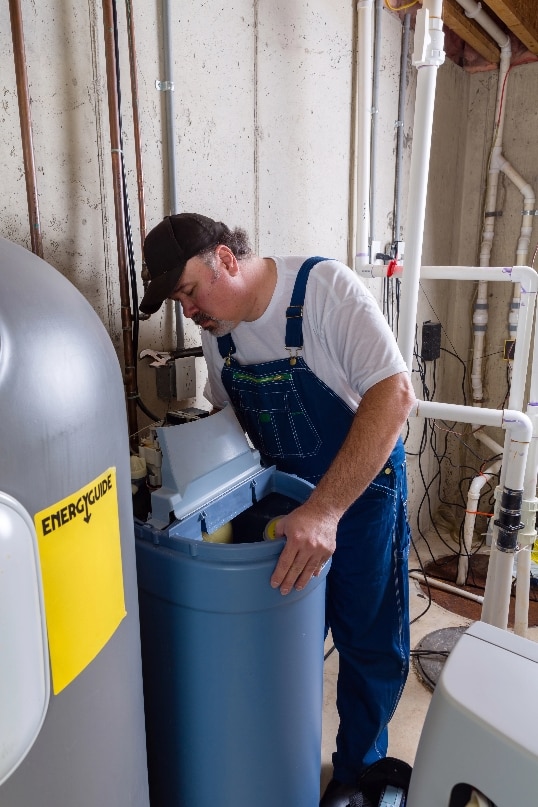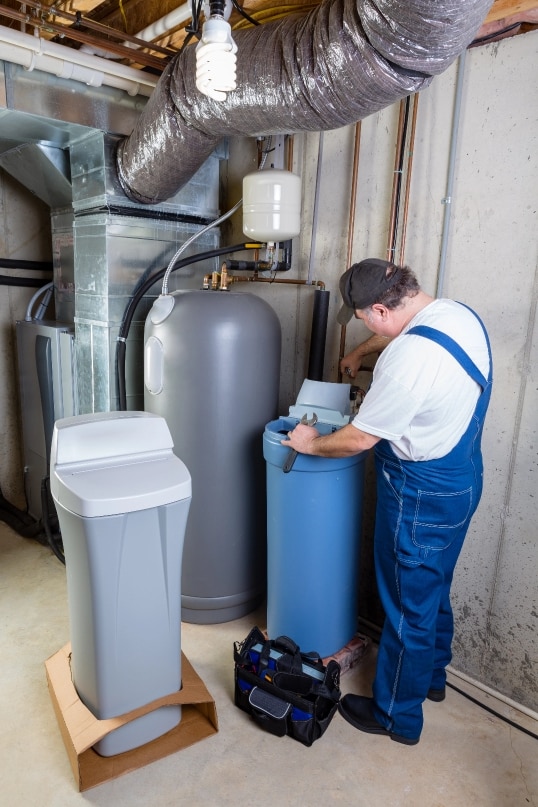
Experiencing hard water in your home can be damaging to your health and appliances. Many homes install water softener systems to help combat this problem. Before you install a water softener in your home, it is best to do research and find the best water softener for your home.
Just like with any home appliance or system, what works for one homeowner, will not work for everyone. Here are some factors to guide you through your purchasing process. When choosing a water softener system, make sure you have a plumber install it to ensure it works properly for many years to come.
How Does A Water Softener Work?
Water softeners work to remove minerals from the water which make your water hard. These minerals like calcium and magnesium can build up in your pipes, cause deposits on your faucets, and damage your hair and skin. People install water softeners to help decrease the amount of minerals in their water or remove them completely.
Water will pass through a resin and essentially be filtered. The calcium and magnesium minerals are attracted to resin, so they are then sucked out of your water, making it softer and easier on your health and appliances. Sodium ions are also released into the water, which helps to increase the softness.
Know The Hardness Of Your Water
Knowing and understanding the hardness of your water will help you choose the right water softener for your home. Many hardware stores or self improvement stores offer water testing kits to tell you how many pounds per million of certain minerals are in your water. Purchasing a softener comes down to choosing the one that can handle your unique water demands.
Consider Your Budget Before Making A Purchase
More advanced systems can help filter the hard water in your entire home, but they can be costly. It can be beneficial to look at your budget and your wants and see which areas you absolutely don’t want to sacrifice on. This will help you narrow down which options are best for you and your family.
Looking at specific brands can also impact a price. It is best to set a budget first and only look at water softener systems in that range.
Different Types Of Water Softeners
Not only will you need to determine what you can spend, but you will also need to asses your homes needs and narrow down the types of water softeners that are available. Here are some of the types of water softeners for your home and more about what they do.
Salt based
These are also referred to as ion exchange systems. This is the system that uses resin to filter the minerals out of your water and puts sodium back into the newly softened water. Some systems put out a higher salt content than others. These are the most popular option for water softeners because they come in multiple sizes and portable options.

Salt free
Uses a template assisted crystallization system to neutralize the minerals rather than remove them. These systems are relatively maintenance free which makes them a popular choice for busy homeowners. If the hard water in your home has a large PPM, salt free systems are not the best choice for you.
Dual tank
Have a large family that uses a lot of water? Dual tank water softeners are the best choice for you! This system uses salt but has double the power to help give you softer water on demand. A higher volume of water can be run through one resin filter, while the other tank goes through a salt regeneration cycle. The only drawback is that dual tanks take up more space in your home.
Magnetic
Magnetic systems work to descale you water, which means the water leaves less deposits inside your plumbing system. This will prevent clogs in your pipes but it does not completely remove the minerals from your water. So the water will only be soft for a few days at a time. Some magnetic softeners can be plugged into an outlet, while others will need to be hardwired into your electrical system. The system itself is around $300-400 but you will need to factor in installation and connecting it to your electrical as well.
Reverse Osmosis
Reverse osmosis systems are typically placed under your sink and are used for your dishwashing and drinking options. These are not typically used to filter your whole home because of their small capacity. They typically have 3 cartridges that fit under your sink giving you softened water in a specific place.
Shower head softeners
Similar to reverse osmosis systems, a shower head softener helps soften the water in just your shower. This will help prevent unhealthy hair and itchy skin that can often come from hard water.
Measure Your Available Space
Depending on the demands of your home, you may need a fairly large water softener. Take into account where the system will need to be installed and how much room you have to work with. Take accurate measurements and consult with a plumber if you have any concerns.
S&B Plumbing can help you determine what water softener is right for your home and install it correctly. We install reverse osmosis systems and a variety of other full home water softeners.
